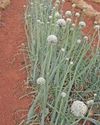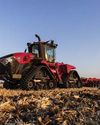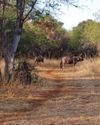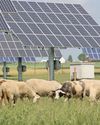
According to Kobus de Klerk, who owns the Mount D’Urban Campsite in partnership with his wife Kirsty and his parents Boeta and Mariette on the family farm near Helmeringhausen, the tourism concern has played a vital role in keeping the farming business afloat during taxing seasons of severe drought.
“Namibia went through a devastating drought between about 2012 and 2019. The campsite played a valuable role in 2019, when the drought was at its worst. The campsite was able to supplement enough income to cover some of the farm’s running costs. In some ways it took pressure off having to sell more stock to buy feed during the drought. Value-wise, in today’s market, it could probably be worked back to roughly 200 marketable lambs,” he says.
The farm is situated in the south-western part of Namibia, 23km north of Helmeringhausen. Separated by the Swartrand mountain range, it stretches about 9 000ha from the edge of the mountain range westward, while the remaining 13 000ha is situated on top of the Swartrand range, extending eastward for about 10km.
The farming business consists primarily of commercial cattle and goat production. In the 1970s, the farm belonged to Consolidated Diamond Mining and was drawn on to supply the operations in Oranjemund with meat products for their workforce.
Remnants of the old feedlots can still be found on the farm today. Coming from the Eastern Cape, the De Klerk family partnership bought the farm in December 1985. It was stocked with cattle and they introduced Angora goats, which was a first for the area, as karakul had predominantly been farmed in the region.
Bu hikaye Farmer's Weekly dergisinin 22+29 December 2023 sayısından alınmıştır.
Start your 7-day Magzter GOLD free trial to access thousands of curated premium stories, and 9,000+ magazines and newspapers.
Already a subscriber ? Giriş Yap
Bu hikaye Farmer's Weekly dergisinin 22+29 December 2023 sayısından alınmıştır.
Start your 7-day Magzter GOLD free trial to access thousands of curated premium stories, and 9,000+ magazines and newspapers.
Already a subscriber? Giriş Yap

When short-term rentals make sense
Bianca Smit, national operations manager at CFAO Equipment SA, outlines factors to consider when choosing a rental equipment partner.

The timing of onion sowing is critical
Each onion variety has a different resistance to bolting, thus growers need experience and knowledge to guide them,

Understanding cannabis and hemp regulations in South Africa
South Africa's cannabis and hemp regulations remain a topic of debate and uncertainty, particularly when it comes to commercial use and small-scale production. Cannabis experts Shaad Vayej and Trenton Birch spoke to Octavia Avesca Spandiel about the challenges that small-scale cannabis and hemp farmers face.

European seed's influence on the US cannabis market
The expansion of European cannabis seed onto the US market is not just about economic growth; it’s also about enriching the landscape of US cannabis with diversity, innovation and education,

'It's important to get the right tool for the job'
The adoption of technology is crucial to sustaining efficiency gains and beating the cost-price squeeze in the agriculture sector.

A brilliant bushveld break between Bela-Bela and Modimolle
The distinctive touch, diligence, and 24/7 customer care are just a few of the reasons you should visit four-star Tourism Council-graded Pumula Game Farm,

John Deere: elevating performance and efficiency in modern farming
In the fast-paced world of farming, the right tools make all the difference.

The naval disaster Winston Churchill tried to hide
Three British warships were sunk by German naval gunfire on a dark day early in World War II, but the heroes who fought back received only muted recognition, possibly to avoid bad publicity,

Breaking down the principles of regenerative farming
Jean Hugo, a post-graduate student at the Tshwane University of Technology, and Leon Hugo, author on environmental matters and former professor of geography at the University of Pretoria, write about the importance of regenerative agriculture for small-scale farmers, and the challenges related to making the shift.

Ectoparasite control: more tips for livestock farmers
To reduce the mayhem that uncontrolled ectoparasites can create for communal farmers, it’s best to adopt a holistic approach in conjunction with veterinary remedies,